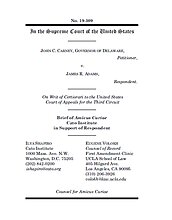James R. Adams is a Delaware lawyer and a former Democrat who became an independent because he believed that the party had drifted to the center, in contrast to his own more progressive views. Adams is a qualified potential jurist and would have submitted himself for consideration for Delaware’s supreme court and superior court were it not for the fact that he would have no chance of being appointed because of the state constitutional provision.
The federal district court ruled for Adams, holding that Section Three of Article IV of the Delaware Constitution violates the First Amendment’s freedom of speech and association. This decision was affirmed in part and reversed in part by the U.S. Court of Appeals for the Third Circuit. The U.S. Supreme Court has granted the Delaware governor’s petition for review and ill hear the case March 25.
Cato has filed a brief, prepared by Eugene Volokh and the UCLA First Amendment Clinic, supporting Mr. Adams in the United States Supreme Court. We argue that Delaware unconstitutionally discriminates against those who are not members of the two main political parties and that, while elected officials may take politics into account in their judicial appointments, such qualifications may not be enshrined in law: The Supreme Court should make clear that the work of a judge is not dependent on political interests and that supposed concerns over “political balance” may not be used to justify partisan tests for judicial office.




